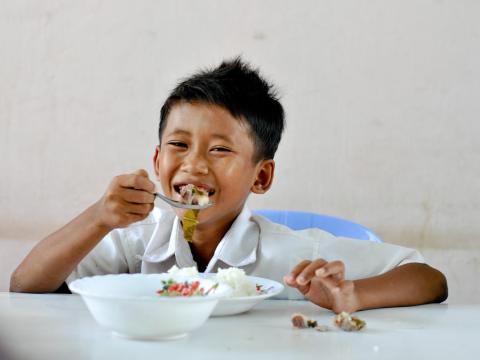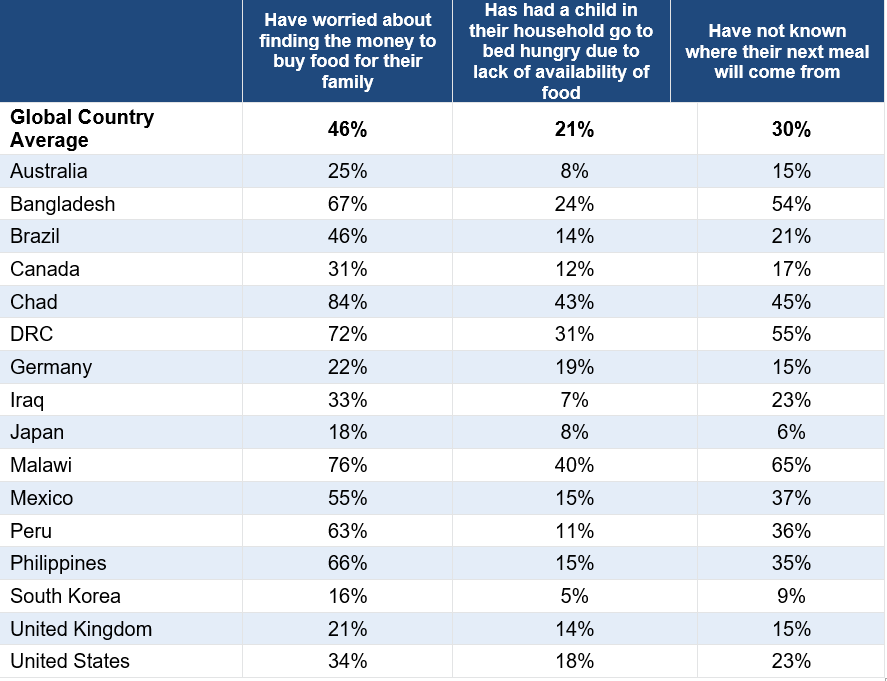Four in Ten (37%) Parents Globally say their Children Don’t Get Proper Nutrients Daily; 21% Say their Children Have Gone to Bed Hungry in the Last Month

World Vision International and Ipsos Release Global Survey on Child Hunger
Toronto, Canada, 12 October 2023 – A new global Ipsos study conducted on behalf of World Vision International in 16 countries reveals almost four in ten (37%) parents/guardians say their children are not getting the proper nutrients they need on a daily basis, and 21% say their children have gone to bed hungry in the last 30 days. Moreover, almost half (46%) of adults globally say they have worried about finding the money to buy food in the last 30 days, rising to 77% in low-income countries.
Six in ten (59%) parents/guardians are very concerned about child hunger and malnutrition in their family, particularly those from lower-income countries (73%). Moreover, the problem is perceived to be getting worse compared to five years ago, both in one’s own community (60%) and in one’s own country (65%), but, especially, globally (71%).
These concerns are informed by the lived experiences of global citizens who are struggling to put food on the table for themselves and for their children.
Notably, in the last 30 days:
- 46% have worried about finding the money to buy food for their family;
- 30% have not known where their next meal will come from;
- 21% say a child in their household has gone to bed hungry due to a lack of availability of food, rising to 38% in low-income countries.
Among those who have had to put a child to bed hungry, the main causes of hunger in their family are said to be inflation and the cost of living (46%), low household income (39%), and not enough government focus on ending hunger (25%).
Andrew Morley, World Vision International President & CEO, said:
Hunger is a global problem, and isn’t limited to any one country or part of the globe. A life of plenty for every child is possible, yet every day more children go hungry. Parents are queuing for food everywhere, and are facing impossible choices.

Malnutrition is widespread and not contained to lower-income countries
The problem of malnutrition is widespread and 37% of parents globally say that their children do not receive the proper nutrients that they need on a daily basis. While this sentiment is felt more widely in lower-income countries such as Chad (66%), Malawi (64%) and the Democratic Republic of Congo (63%), roughly two in ten parents or guardians in Germany (24%), the United States (20%), Australia (19%), Canada (18%) and South Korea (17%) say their children also don’t receive the nutrients they need on a daily basis.
"There is enough food in the world for everyone” Morley adds. Yet much of it is thrown away, while millions of children continue to endure the pain of hunger and malnutrition. The findings from this latest research show the alarming reality facing millions of children around the globe. They have had enough; we have had enough. It is time now for robust action. We must unite to end hunger malnutrition for every girl and boys, everywhere. Only then can children truly reach their God-given potential in life.
Too many parents do not get to make the choices that would keep their children healthy and growing. They must do whatever they can - including selling things the family needs to produce food and marrying off their daughters. Around the world, from Bangladesh to America, some have a surplus of food while many others have too little.”
Global Citizens Underestimate the Impact of Hunger and Malnutrition
A staggering 45% of global deaths among children under age five are caused by poor nutrition but when asked to guess what proportion of global deaths among children under age five are caused by poor nutrition, nearly half (44%) of those who ventured a guess grossly underestimated the prevalence, estimating this to be below 30%. Moreover, nearly half (46%) of poll respondents could not venture a guess, demonstrating that the extent of the problem is a blind spot for most citizens around the world.
Globally, Inflation and Increased Cost of Living Named Main Cause of Hunger at Country Level, Government Intervention Seen as Solution
Inflation and the increased cost of living (55%) and not enough government focus (37%) are seen as the main causes of hunger at the country level. These are problems which governments could choose to address through interventions, and the public supports policies to address these challenges.
For example, it is unanimously believed (97%) that it is important for children to have something to eat during the school day, and therefore 85% support governments funding school meals. Yet, only 40% of parents/guardians say that the children in their household have been provided a school meal in the past 30 days. The importance of this is undeniable: those whose children have received a school meal are more likely to say their children receive the proper nutrients they need on a daily basis.
Only 33% Believe UN Sustainable Development Goal of Eliminating Global Hunger by 2030 will be Achieved, Despite Having Enough Food to Do So
Global citizens are not seeing enough progress on the United Nations Sustainable Development Goals, and most (74%) say that too many children in their country are going hungry. Moreover, only 37% believe that child hunger will be eliminated by 2030 in their own country, and even fewer (33%) believe that it will be eliminated globally by 2030. Australians (17%), Canadians (17%), Germans (16%) and the Japanese (9%) are particularly pessimistic.
In 2015, global government leaders joined together to establish nutrition targets but failed to invest in them. Today, hundreds of millions of children suffer from curable diseases, are underweight, stunted, wasted, anemic and overweight. As world crises push up hunger, the number of children facing malnutrition is also skyrocketing.”, continues Morley.
Three-quarters (75%) believe that their government isn’t doing enough to support families struggling in their own country, and seven in ten believe their government isn’t doing enough to end child malnutrition (71%) or to solve the global hunger crisis (69%).
And yet, global citizens believe we have the recipe to end child hunger, with most (84%) maintaining that we have enough food in the world for everyone if we share and that having enough food to eat is a basic human right (91%).
Citizens Call on Governments to Step Up, but Many Playing their Own Part Too
Global citizens say that government (68%) has the greatest responsibility for solving child hunger. But the responsibility is also shared by parents/guardians (48%) and organizations/agencies (34%). Thankfully, those with the responsibility also have the trust, with government (40%), parents/guardians (37%) and organizations (including NGOs and charities) (29%) cited as the entities they most trust to solve child hunger.
Individuals are also doing their own part: in the past 12 months many have given food to someone in need (43%), supported a hungry family locally (26%), or donated to a charity or faith-based community organization which provides food for the hungry (21%), among other actions.
Ultimately, most (89%) global citizens firmly believe that we all have a responsibility to end world hunger. We’ve had enough, and if governments, citizens, businesses, and NGOs work together, we can work more quickly towards ending hunger and malnutrition among children. We have enough.
About World Vision’s Enough Campaign
World Vision is working in 100 countries to provide millions of hungry people with food or the means to buy food and other life-saving services in response to disasters, conflict and famines. Local faith communities partner with us to identify vulnerable families, share meals and advocate for more just, nutritious and sustainable food systems. Our Global Hunger Response is the largest emergency hunger response we have ever undertaken, spending more than $1 billion dollars to help 22 million people in 28 countries. It is the biggest any NGO has ever attempted. But it’s not ENOUGH.
That’s why this World Food Day World Vision is launching a new campaign to make children visible in global and national statistics around hunger and nutrition, drive real change in the places where children are receiving food support—emergency food assistance programmes, school meals and community health services—and lead global efforts to get more and better aid invested in ending child hunger and malnutrition.
To find out more, please visit: wvi.org/enough
About the Study
These are the results of a 16-country survey conducted for World Vision by Ipsos. Ipsos interviewed an international sample of 14,131 adults aged 18 and over in Australia, Brazil, Canada, Chad, the DRC, Germany, Iraq, Japan, Malawi, Mexico, Peru, Philippines, South Korea, U.K, U.S, and aged 19 and over in Bangladesh.
The fieldwork was conducted between August 16, 2023 and September 4, 2023 online in Australia, Bangladesh, Brazil, Canada, Germany, Japan, Mexico, Peru, Philippines, South Korea, U.K and the U.S. The fieldwork was conducted via Computer Assisted Telephone Interviewing (CATI), between September 13, 2023 and September 19, 2023 in the DRC and Malawi, between September 13, 2023 and September 21, 2023 in Chad and between August 31, 2023 and September 15, 2023 in Iraq.
The sample consists of approximately 1,000 individuals in each of Canada, the U.S., Germany, United Kingdom, Australia, Japan, South Korea, Philippines, Brazil, Mexico, Peru, Bangladesh and approximately 500 individuals in Chad, the DRC, Malawi and Iraq. All countries have been equally weighted so that each country has an equal impact on the aggregate results.
The samples in Philippines, Brazil, Peru, Bangladesh, Chad, the DRC, Malawi, Iraq and Mexico are more urban, educated, and/or more affluent than the general population.
They are not nationally representative of their country. The survey results for these countries should be viewed as reflecting the views of the more “connected” segment of their population. The samples in Canada, Germany, United Kingdom, Australia, Japan, South Korea, U.S. are national representative.
The "Global Country Average” reflects the average results for all the countries where the survey was conducted. It has not been adjusted to the population size of each country and is not intended to suggest a total result. Where results do not sum to 100 or the “difference” appears to be +/-1 more/less than the actual, this may be due to rounding, multiple responses or the exclusion of “don’t know” or not stated responses. The precision of Ipsos online polls are calculated using a credibility interval with a poll of 1,000 accurate to +/-3.5 percentage points and of 500 accurate to +/-5.0 percentage points. For more information on Ipsos’ use of credibility intervals, please visit the Ipsos website. The publication of these findings abides by local rules and regulations.
For more information on this news release, please contact:
Niamh Cooper
Global Director Public Engagement
niamh_cooper@wvi.org
+353 87 942 3371
Sean Simpson
Senior Vice President, Ipsos Public Affairs Canada
Sean.Simpson@ipsos.com
About World Vision
World Vision is a Christian humanitarian and development organisation dedicated to working with children, families and their communities to reach their full potential by tackling the root causes of poverty and injustice.
World Vision serves all people, regardless of religion, race, ethnicity or gender. For more information, please visit www.wvi.org or follow us on Twitter @WorldVision
About Ipsos
Ipsos is the world’s third largest market research company, present in 90 markets and employing more than 18,000 people.
Our passionately curious research professionals, analysts and scientists have built unique multi-specialist capabilities that provide true understanding and powerful insights into the actions, opinions and motivations of citizens, consumers, patients, customers or employees. We serve more than 5000 clients across the world with 75 business solutions.
Founded in France in 1975, Ipsos is listed on the Euronext Paris since July 1st, 1999. The company is part of the SBF 120 and the Mid-60 index and is eligible for the Deferred Settlement Service (SRD).
ISIN code FR0000073298, Reuters ISOS.PA, Bloomberg IPS:FP